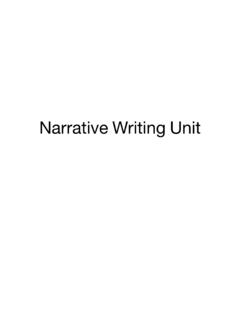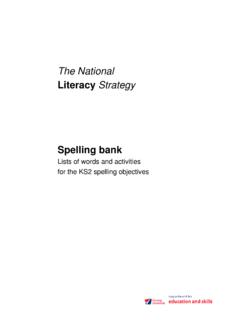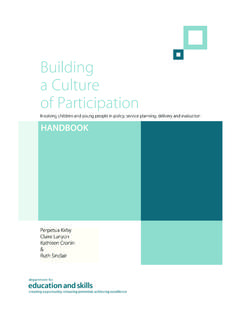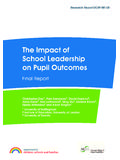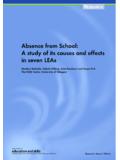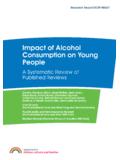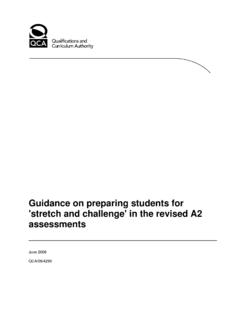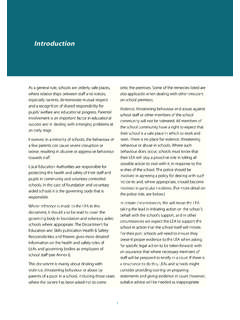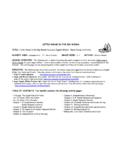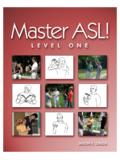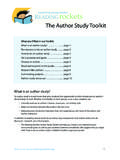Transcription of Formal and Explanation Writing Unit - UCL Institute …
1 Formal and Explanation Writing unit Year 6 Planning Exemplification 2002 2003. Formal and Explanation Writing unit Contents Introduction 3. List of resources 5. Framework objectives 6. unit plan: week 1 8. unit plan: week 2 9. Resource sheets Lesson notes and transcripts for days 1, 2, 6 and 7 11. 2a and 2b: Informal invitation OHT and annotations 17. 2c and 2d: Formal invitation OHT and annotations 19. 2e: Comparative grid OHT 21. 3: Newspaper report OHT 22. 4a and 4b: DVLA leaflet extract OHT and annotations 23. 5a and 5b: Passport application OHT and annotations 25. 6a and 6b: Informal letter of complaint OHT and annotations 27. 6c and 6d: Formal letter of complaint OHT and annotations 29. 7: Complaint scenario OHT 31. 8a and 8b: Informal Explanation OHT and annotations 32. 8c and 8d: Formal Explanation OHT and annotations 34.
2 9a and 9b: Formal Explanation OHT and annotations 36. 9c: Flow chart OHT 39. 9d: Car accident notes OHT 40. 10a and 10b: Volcanoes OHT and annotations 41. 11: Earthquakes (opening) OHT 44. The National Literacy Strategy 2. Year 6 Planning Exemplification 2002 2003. Formal and Explanation Writing unit Introduction Preparation for this unit Prior to teaching this unit , it would be helpful for teachers to be familiar with the mark scheme for the 2003 Key Stage 2 Writing test. Changes to assessment 2003: sample material for Key Stages 1 and 2 has been sent to all schools as a booklet and is also on the QCA website with some additional sample material at The assessment focuses in the 2003 mark scheme are drawn together under strands: sentence construction and punctuation, text structure and organisation, composition and effect.
3 These are the elements of Writing covered by the word, sentence and text level objectives in the NLS. Framework for teaching. Sentence construction and punctuation vary sentences for clarity, purpose and effect write with technical accuracy of syntax and punctuation in phrases, clauses and sentences Text structure and organisation organise and present whole texts effectively, sequencing and structuring information, ideas and events construct paragraphs and use cohesion within and between paragraphs Composition and effect write imaginative, interesting and thoughtful texts produce texts which are appropriate to task, reader and purpose The two word-level focuses are select appropriate and effective vocabulary use correct spelling The vocabulary focus is assessed through all three strands and the spelling focus is assessed through a separate spelling test.
4 Changes to assessment 2003: guidance for teachers (KS2 English) has also been sent to all schools. In order to understand the mark scheme, this booklet suggests: comparing the 2002 sample materials with test papers from previous years;. using a script of a longer Writing task in the sample materials on the website, cutting up the annotated notes and matching them to the appropriate places in the script;. applying the strands from the mark scheme to the scripts;. giving the children a sample longer task using a prompt from the website, and marking a selection of pieces of Writing with a colleague using the 2003 mark scheme. The National Literacy Strategy 3. Year 6 Planning Exemplification 2002 2003. Formal and Explanation Writing unit The unit In this unit on Formal Writing and explanations, the resources for analysing texts and for demonstrating Writing have been annotated under the three strand headings: sentence construction and punctuation, text structure and organisation, composition and effect.
5 The unit extends children's understanding of Explanation Writing and the use of Formal language features by comparing informal and Formal texts; analysing and demonstrating written texts;. and supporting the children in Writing their own Formal texts and explanations. While reading the texts, analysing them and participating in demonstration lessons the children will learn how to construct sentences and paragraphs to achieve the effects needed to inform the reader. In the plenary, the teacher will have the opportunity to respond to the children's Writing with the three assessment strands in mind. Written outcomes of the unit Formal invitation Glossary of Formal words and phrases Formal Explanation of the function of a library card Formal letter of complaint Two brief Formal explanations An extended Explanation of a process Resources The resources for the unit include lesson notes and transcripts for the first two days of each week, texts for analysis and texts to use to demonstrate Writing .
6 Annotated versions of the texts are also provided showing the effective features of the sample texts. These are notes for the teacher to use as support during the analysis of the text with the children and as points to bring out during teaching. Resource sheets 2 and 3 are related to social events. The invitations provided on Resource sheets 2a and 2b can be substituted to reflect other celebrations in our culturally diverse society. Teachers may also wish to replace the report of a ball with a report of a different celebratory event relevant to the lives of their pupils, or a fantasy event, Prince Charming's ball. Copies of the booklets from which Resource sheets 4a and 5a are taken can be obtained from post offices. Teachers may wish to have copies of the authentic documents to show to pupils. If possible they should also have some examples of different invitations to supplement those in Resource sheets 2a and 2c.
7 Books, articles, CD-ROMs and Internet access to materials on earthquakes are needed for the children to undertake research on day 8. The two weeks of this unit can be taught as a fortnight of work or be split into two separate weeks; alternatively, one week may be taught and not the other. The National Literacy Strategy 4. Year 6 Planning Exemplification 2002 2003. Formal and Explanation Writing unit List of resources 1 Lesson notes for days 1, 2, 6 and 7. Resources for day 1. 2a Sample text: Informal invitation 2b Annotated informal invitation 2c Sample text: Formal invitation 2d Annotated Formal invitation 2e Comparative grid Resources for day 2. 3 Sample text: Newspaper report of ball Resources for day 3. 4a Sample text: Extract from DVLA leaflet D100. What you need to know about driving licences 4b Annotated DVLA leaflet extract Resources for day 4.
8 5a Sample text: Extract from Passport Office leaflet How to fill in your passport application form 5b Annotated Passport Office text Resources for day 5. 6a Sample text: Informal letter of complaint 6b Annotated informal letter of complaint 6c Sample text: Formal letter of complaint 6d Annotated Formal letter of complaint 7 Complaint scenario Resources for day 6. 8a Sample text: Informal Explanation 8b Annotated informal Explanation 8c Sample text: Formal Explanation 8d Annotated Formal Explanation Resources for day 7. 9a Accident Formal Explanation 9b Annotated Formal Explanation 9c Flow chart 9d Notes for car accident Resources for day 8. 10a Sample text: Volcano Explanation 10b Annotated volcano Explanation Resources for day 9. 10a Sample text: Volcano Explanation 11 Sample text: Earthquake Explanation (opening).
9 Resources for day 10. 10a Sample text: Volcano Explanation The National Literacy Strategy 5. Year 6 Planning Exemplification 2002 2003. Formal and Explanation Writing unit Formal Writing objectives Year 6 Term 2. Text Pupils should be taught: 17 to read and understand examples of official language and its characteristic features, through discussing consumer information, legal documents, layouts, use of footnotes, instructions, parentheses, headings, appendices and asterisks;. 20 to discuss the way standard English varies in different contexts, why legal language is necessarily highly formalised, why questionnaires must be specific. Sentence Pupils should be taught: 1 to investigate further the use of active and passive verbs: secure the use of the terms active and passive;. know how sentences can be reordered by changing from one to the other.
10 Identify examples of active and passive verbs in texts;. experiment in transformation from active to passive and vice versa and study the impact of this on meaning;. consider how the passive voice can conceal the agent of a sentence, the chicks were kept in an incubator;. 2 to understand features of Formal official language through, : collecting and analysing examples, discussing when and why they are used;. noting the conventions of the language, use of the impersonal voice, imperative verbs, Formal vocabulary;. collecting typical words and expressions, those wishing to ' '. forms may be obtained ';. 4 to revise work on contracting sentences: summary;. note making;. editing. Word Pupils should be taught: 4 to revise and consolidate work from previous four terms with particular emphasis on: learning and inventing spelling rules.
